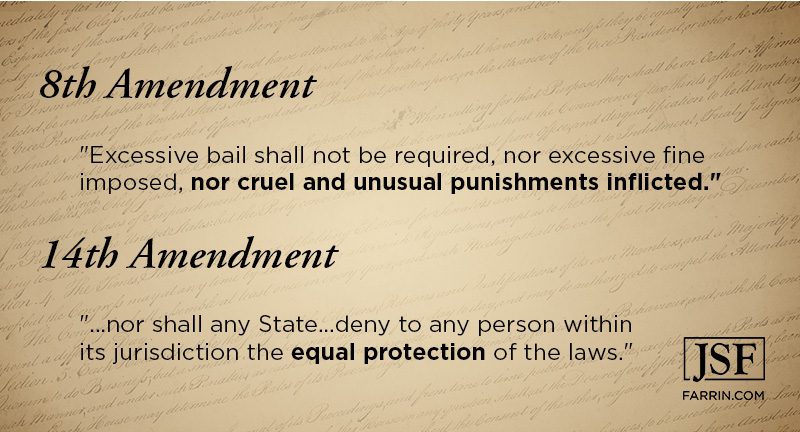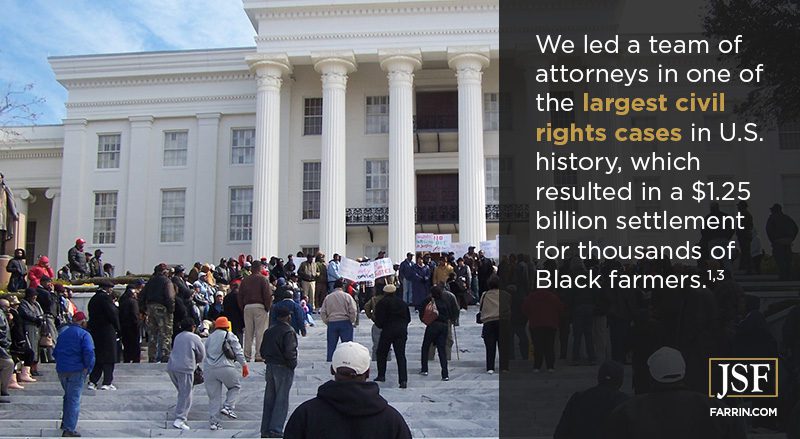
Have you suffered prison abuse?
Staying silent may make it worse. If your civil rights have been violated, we can help you fight back.
Prison Abuse Lawyers in North & South Carolina Help Protect Your Civil Rights
The U.S. prison system suffers from many disparities and violations of basic human rights. But prisoners have rights, too, including protection from prison abuse, unfair treatment, and/or wrongful death.
If your civil rights were violated during your imprisonment in jail or prison, we are here to help you. Contact us online or call us at 1-866-900-7078 today for a free case evaluation – there is no obligation.
Prison Abuse: What You Need to Know
Incarcerated people are protected by the 8th Amendment, which prohibits cruel and unusual punishment, and the 14th Amendment, which prohibits unequal treatment based on race, sex, or creed.
When prisoners’ civil rights are abused, they can be subjected to physical and/or psychological harm.
- Physical prison abuse may include sexual assault, overuse of restraints, electrical shocks and tasering, and beatings. Prison abuse may also come in the form of neglect, such as the withholding of needed items for one’s physical well-being, including food and medical care.
- Psychological prison abuse includes mental torture, verbal abuse (including racial or religious discrimination), prolonged sleep and sensory deprivation, and extreme solitary confinement.
- Facility inadequacies, such as extreme temperatures, rodent and bug infestations, plumbing problems, and excessive overcrowding can result in physical and psychological prison abuse as well.
An experienced civil rights attorney can help you seek compensation for physical or emotional mistreatment you may have suffered while incarcerated or in custody.
Does Solitary Confinement Unfairly Target People of Color and Mentally Ill Inmates?
In 2020, North Carolina’s Task Force for Racial Equity in Criminal Justice suggested that N.C.’s Department of Public Safety policy and regulations allow implicit racial bias, which leads to a disproportionate number of people of color suffering in long-term solitary confinement.
In South Carolina, a court ruling found that South Carolina prison officials were guilty of exposing seriously mentally ill inmates to “a disproportionate use of force and segregation (solitary confinement) when compared with non-mentally ill inmates.”
Unfortunately, the practice of solitary confinement continues in both North and South Carolina, and it is often people of color and those with mental illness who suffer the worst.
Section 1983 and Medical Malpractice Claims for Prison and Jail Inmates
Inmates can seek justice against health care providers and prison officials who deny or provide inadequate health care. Section 1983 of the U.S. Constitution gives an individual the right to sue state government employees and others acting “under color of state law” for violations of civil rights – and prisoners share this right.
Inmates can sue for medical malpractice and seek monetary relief if they can prove that prison conditions caused harm to their health and safety in violation of the 8th Amendment protection against cruel and unusual punishment. You must also prove that a serious deprivation of a basic human need and deliberate indifference to prison conditions existed.
You are entitled to proper medical care while incarcerated, and it is the correctional facility’s responsibility to provide it.
If you have been denied this medical care, your civil rights likely have been ignored. In order to seek compensation for this injustice, you must be able to prove the very high standard of deliberate indifference and show that medical providers or prison officials knew of and disregarded your serious medical need. We can help you.
Call today at 1-866-900-7078 for a free case evaluation.
How Prison Abuse Lawyers Fight for Prisoners’ Civil Rights
If you or a loved one suffered neglectful or abusive behavior while in custody or incarceration, your civil rights were disregarded. Correctional facilities, whether private or public, are responsible for your safety and health, and prison abuse lawyers can be your voice when prison abuse occurs.
Don’t assume that you have no options. An experienced lawyer can help you seek compensation for prison abuse you may have suffered.
Your civil rights attorney can:
- Listen to your story, answer your questions, and provide objective advice
- Check medical examiner reports for evidence of prisoner mistreatment
- Investigate prison policies and practices to see if they violate your Constitutionally-protected rights
- Examine disciplinary records of prison guards and employees
- Research municipality laws and regulations for possible Monell claims Monell claims can be pursued if a government entity, such as a police department, plays a role in violating your rights due to their policies, practices, or culture. A Monell claim can hold the government accountable for the civil rights violations committed by its agents.
- File a complaint in State or Federal court
- Negotiate potential resolutions
- Represent you in court if needed
Law Offices of James Scott Farrin: Committed and Caring
We’ve been helping protect our clients’ rights for decades – including leading a team of attorneys in one of the largest civil rights cases in U.S. history and winning a $1.25 billion settlement for thousands of Black farmers who suffered discrimination by the U.S. Department of Agriculture.1,3
If you, or a loved one, are victims of prison abuse, we are here to help. We have the experience and resolve to fight for government accountability when an injustice has occurred. And because we work on a contingency fee basis, you pay no upfront costs, and we won’t collect any attorney’s fee at all unless we get compensation for you. Guaranteed.2
Your needs come first, and we will fight for as much compensation as possible, as quickly as possible. We have many convenient offices, or we can come to you anywhere across North or South Carolina.
Call us today at 1-866-900-7078 or contact us online for your free case evaluation.



